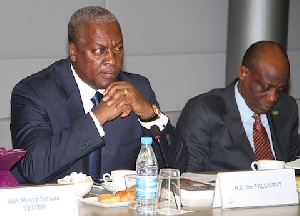The confidence of businesses in the economy has reached its lowest point thanks to the government’s misguided policies which have failed to address their needs, the Private Enterprise Foundation (PEF) has said.
PEF, which is the umbrella-body of private businesses, has described the sentiments and mood of businesses in the economy as “horrible”, “Shocking”, and “deteriorating”.
The sentiments of PEF are in line with those of the Association of Ghana Industries (AGI) expressed in May, which called for “drastic measures” to arrest the dwindling fortunes of businesses as confidence is in its worst dip in four years.
The central bank in its last Monetary Policy Committee report in April this year also expressed concerns about the waning consumer and business sentiments, as well as tightened credit conditions which could impact on the general economic outlook.
The CEO of PEF, Nana Osei-Bonsu, told the B&FT that the failure on government’s part to recognise the depth of economic challenges in the country and formulate appropriate policies to address them is scaring businesses.
“These are some of the mild comments of businesses because they are failing; and when your lifeline is being threatened, obviously you will not look kindly at it -- and businesses are looking at a deteriorating economic situation.
“Where is the macro-economic stability that we talked about? The most difficult part is the failure on the part of government to recognise the depth of our problem. Government comments like ‘we are going through short-term challenges and difficulties, and this is like a hiccup’ are not helping. These are hurricanes! This is not a hiccup.
“Unless you see the magnitude of the distress and crisis, you are not going to prescribe the right solutions. If you think that it’s like a hiccup and not a deep-deep thing that is affecting us and don’t strategise with a deep panacea to address it, failure is what scares businesses. Because then it means we are not using the right strategies going forward, and that doesn’t give businesses the confidence to be able to do what they need to do.
“Do we produce at full-scale, 50% or even stop production looking at tomorrow? We cannot tell, because the policies are not there. So unless government recognises the deficiencies and creates the policy structure that will give confidence to the investors and business community, we are indeed in for a long haul,” he said.
Since the year began, the cedi has depreciated by about 25% against the US dollar while inflation has hit 14.8% in May from 13.5% at the start of the year, which puts the end-year inflation figures at 9.5%.
Prices of petroleum products have been adjusted upward three times, which sums up to about 16 percent as a result of the currency’s slide.
The fall in the value of the cedi caused the Ghana’s Public Utilities and Regulatory Commission (PURC) to hike utilities tariffs by 12% and 6.1% for electricity and water respectively with effect from July 1. Businesses are also now confronted with intense erratic power supply across the country, which has shot up their cost of operations.
Currently, banks are lending at rates between 27% and 30%. Government’s public debt profile is at about 60% of GDP, while the budget deficit is in the double-digits against an end-of-year target of 8.5%.
Last week, credit rating firm Moody’s downgraded Ghana’s sovereign rating to B2 from Bl, citing the country’s rising debt burden and deteriorating debt affordability as the rating agency expects public debt to exceed 65 percent of Gross Domestic Product (GDP) by the end of 2015 from 55.7 percent in 2013, mirrored by rising interest expenses relative to government revenues.
Nana Osei-Bonsu, who heads the private sector advocacy group that has about 15 private business associations under its umbrella, said though government’s handling of the economy cannot be described as “deliberate”, efforts to deal with the current macroeconomic imbalances have been uninspiring.
“I don’t think it (government’s white-washing of the challenges) is deliberate. It is either they don’t understand or they are using politics as the best means to address it. Maybe the expertise is not even there, but I don’t think it is deliberate.
“However, the challenges are things that require strategies and actions to address the gaps,” he added.
Business News of Wednesday, 2 July 2014
Source: B&FT













